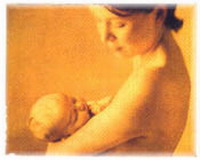American Academy of Pediatrics updates list of advices for breast-feeding mothers
With few exceptions, human breast milk is the best source of nourishment for human infants. However, experts disagree about how long to breastfeed to gain the greatest benefit, and how much more risk is involved in using artificial formulas.

It’s impossible to try and resolve all the problems the scientists come across, but still the latter make solid steps ahead to improve their advices and to protect both a mother and a child.
The latest concern of the American Academy of Pediatrics was the problem of babies' allergies. It published a report with advices concerning nutrition during pregnancy and lactation. Lately it
has renewed earlier suggestions about food allergies, asthma and allergic rashes.
Earlier the doctors advised breast-feeding mothers of a family history of allergies to avoid cow's milk, eggs, fish, peanuts and tree nuts while breast-feeding.
The experience showed that when all the conditions were fulfilled but the allergy went on, parents tended to blame themselves, but, actually, it turned out that the study wasn’t worked out properly, because the banned products might have had nothing in common with the problem.
The new report published in the January issue of the journal Pediatrics improved the list of advices:
- There is no convincing evidence that women who avoid peanuts or other foods during pregnancy or breast-feeding lower their child's risk of allergies.
- For infants with a family history of allergies, exclusive breast-feeding for at least four months can lessen the risk of rashes and allergy to cow's milk.
- Exclusive breast-feeding for at least three months protects against wheezing in babies, but whether it prevents asthma in older children is unclear.
- There is modest evidence for feeding hypoallergenic formulas to susceptible babies if they are not solely breast-fed.
- There is no good evidence that soy-based formulas prevent allergies.
- There is no convincing evidence that delaying the introduction of foods such as eggs, fish or peanut butter to children prevents allergies. Babies should not get solid food before 4 to 6 months of age, however.
The new study proves the inconsistence of the former report and urges every mother to study properly the history of illnesses and allergies before making any conclusions.
Subscribe to Pravda.Ru Telegram channel, Facebook, RSS!




